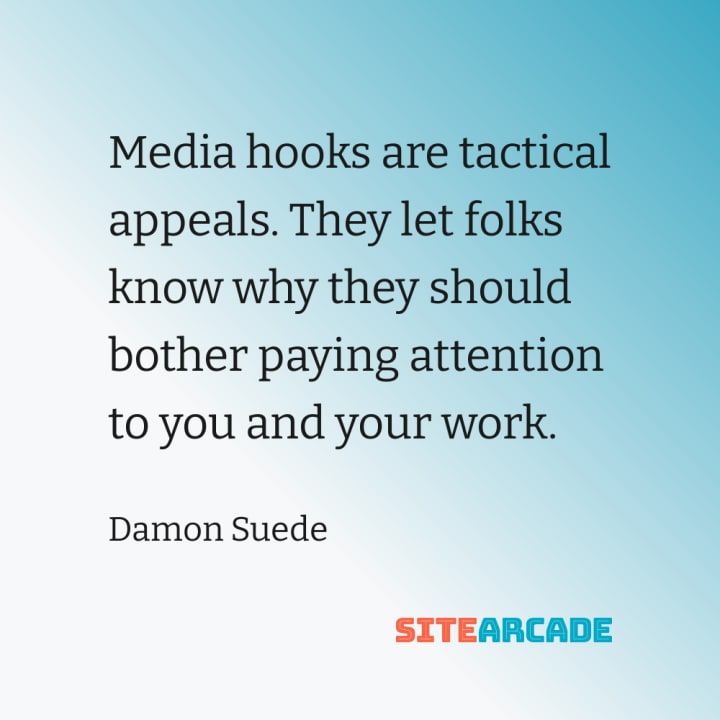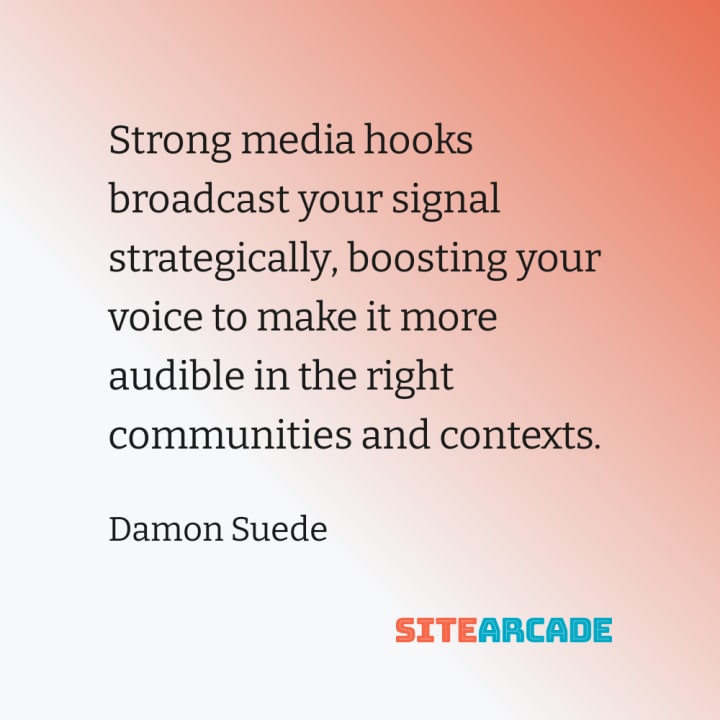How to Use Media Hooks to Snag the Right Kinds of Attention
Imagine your phone is ringing at this moment. You answer it and on the other end, an eager television producer or magazine columnist or documentary filmmaker asks if you’d be interested in talking about your work to a few hundred thousand strangers. Who doesn’t love free publicity, amIright? That’s a hell of an opportunity and one that would absolutely put your work into new hands you’d never otherwise reach.
Once they asked, how would you answer? More importantly, would you be telling the truth? If you answered no, would you actually be doing so out of disinterest? If you answered yes, would you be able to hold up your end of the bargain? How soon could you be ready? What would prep you better?
Entertainment moves at light speed. In the business we call show, media outlets are constantly looking for content and yet books get no love. Rarely, if ever, do genre authors break through the noise to boost their signal. For most of the world, “my book just came out” is hella weak tea, newswise. 99% of the world won’t care enough to pay attention, so the media certainly can’t afford the risk.
Partially this is because there are simply too many books that don’t stand out or measure up. The glut of iffy fiction and Brobdingnagian boxsets which have crowded shelves over the past decade. More often, it’s because most authors have no idea how to sell their story. Oh, they can tell you what happened; they can name the characters, describe settings, and decorate with snazzy details like narrative parsley. Unfortunately, all these bits make for pretty lousy copy with the average viewer or listener. The very things which make fiction so unforgettable on the page don’t play the same way in periodicals or programs. No-go.
How do you communicate the stuff which compels people to give a what-what?
I’ve long believed the most neglected component of author promotion is basic media training. While it isn’t a magic bullet, every author needs a grasp of the simple tips, tricks, and traps which help steer all your public interactions with the media.
One of the simplest, and the one I would like to talk about this month is media hooks.
What Are Media Hooks?
In the simplest terms, a media hook is a tactical appeal to media outlets. Think of it as strategic attention bait which puts your most fascinating foot forward for the widest possible audience.
Whether focused on your latest book, or your personal bio, a media hook serves two functions:
- Summarizing the unique emotional appeal of your voice and your work.
- Signaling your awareness of the publicity process and your willingness to facilitate it.
At the end of the day, the real currency in the modern economy is attention. Nothing can take the place of genuinely engaged audience members who won’t touch that dial. That’s true for all media and authors willing to earn those eyeballs will find the media enthusiastic partners in their promotional process.
Never (and I mean never) underestimate the power of self-interest. You want an audience for your books and this person with the program/
Media Hooks in Action
Now, let’s go back to that imaginary phone call: maybe you have a book coming out in a few weeks that you can’t wait to pimp to millions or maybe you’re deep in a rough draft but you know you can boost your author profile by reaching out to folks who never heard of you. Either way a set of media hooks can make you an appealing prospect for a producer or periodical looking to book you.
Remember, media hooks are tactical appeals. They let folks know why they should bother paying attention to you and your work. Whether you’re selling your book or your body of work, the basic issues remain the same:
- You must own your brand and embody it. You need to be authentic, clear, and passionate throughout.
- You need to identify the selling points that make you or your new book attractive to media and venues.
- Know and articulate the “brand story” (i.e. yours and/
or your books) so you can leverage it for broader reach. - Never regurgitate or recycle. Clichés are a clear sign that the buzzards are circling.
- You should aim to contribute to the value (and values) of any situation/
event/ community. Leave things better and more beautiful than you found them.

If your focus is a new book, can you think of three fascinating details clear enough to be communicated in under a minute? Have you pinpointed the popular tropes, the appealing details, and the fan bait hiding under the hood? Are there any current events or issues with which the book resonates? Nail down a few emotional selling points that don’t take a lot of explanation or backstory.
Then again, if your focus is your entire body of work, what unforgettable anecdotes or observations would you like to share with that many people? How do you fit into your audience’s imaginal landscape, as an author and an archetype? Are there themes or topics you revisit often in your work which make you expressive and enthusiastic? Cultivate a sense of how the public sees you at your best and how your work makes the world better.
Of course the media likes things in clear boxes and very few great books fit in boxes. In essence this is the challenge of all mass-market book promo how to boil several hundred pages down into a soundbite. The secret is clear emotional appeal that offers media pros exactly what they’re looking for. Above all a media hook snags their attention and doesn’t let go. Mass market genre successes have serious cultural impact but they’re rare because of the challenge of boiling a book into a satisfying bite. Get boiling, yo! Distill that ineffable essence with the rigor and vigor of a demented alchemist.
Choosing Effective Media Hooks
Consider that imaginary phone call again, why would they call you and what do they expect you to offer that no one else could? Be pragmatic and positive about your potential contribution and ruthless about zeroing in on your strongest selling points. Identify the selling points that make you attractive to outlets and venues. What are your obvious media hooks? Why should anyone bother?
Because all media operates on a deadline, the more direct and accessible your hooks the more likely they are to get the job done. Certain classic clickbait remains evergreen: How can you offer the media…?
- TOPICALITY that connects you to a current cultural moment*.* What is on the world’s mind right now that’s related and relevant? Newsjack for the win!
- CLEAR SOLUTIONS to universal/
pressing problems. Does your book address something, expose something, or resolve something problematic? Offer emotional rides that heal & inspire! - IMMEDIATE, TANGIBLE BENEFITS to their audience (as well as yours). What kind of extraordinary emotional ride can you guarantee everyone who reads your work? Make people’s live better!
- PROVOCATIVE INSIGHTS to debunk myths, shock the complacent, and/
or expose opportunities. Does your work break rules, change minds, flip paradigms, or stone the crows? Rattle cages, battle clichés!
Make a shameless list! When you have time to splash around in your own assets, develop a list of media hooks for yourself, your latest book, and/
Media Hooks will Help You Stand Out
Of course, media hooks are not just for media: they work for any context in which you want attention. They work on panels, presentations, even casual comments at conferences. They shore up all your public interactions and can even shape the kinds of events you attend.
In the long run, promoting your work to the same 75 blogs, the same ten thousand superfans doesn’t make a lot of sense, and yet most authors do exactly that, duking it out with their peers over the same oversaturated market. Why keep hammering on the same sets of eyeballs? The math makes no sense. Every bestseller in history—from Gone with the Wind to Gone Girl— exploded onto popular consciousness because of nonreaders…folks who’ve never picked up a book suddenly gave fiction a whirl and dug it so much they just HAD to spread the word. Unless you’re a brand-name bestseller, your best opportunities are in creating new genre readers in your niche.
That’s where savvy media hooks can prove unstoppable.

Your market may overlap with other people near you on the bookshelf, but I believe we each have our own unique audience, for whom our voices resonate singularly. When promoting genre fiction, the great challenge is tapping that vast personalized market knowing that it is scattered and battered by hard-sell and hack work. Strong media hooks broadcast your signal strategically, boosting your voice to make it more audible in the right communities and contexts.
Moreover, pinpointing the most powerful appeals of your work can also clarify the projects you choose and the deals you make. Precision and coherence packs a serious wallop, especially in an industry glutted with vague, derivative dreck. Given the right tools, the right message, media partners and genre events will help you communicate with your ideal audience more clearly and effectively so the people who need your voice and your books will find you faster. So bait that hook mindfully, and let it fly.